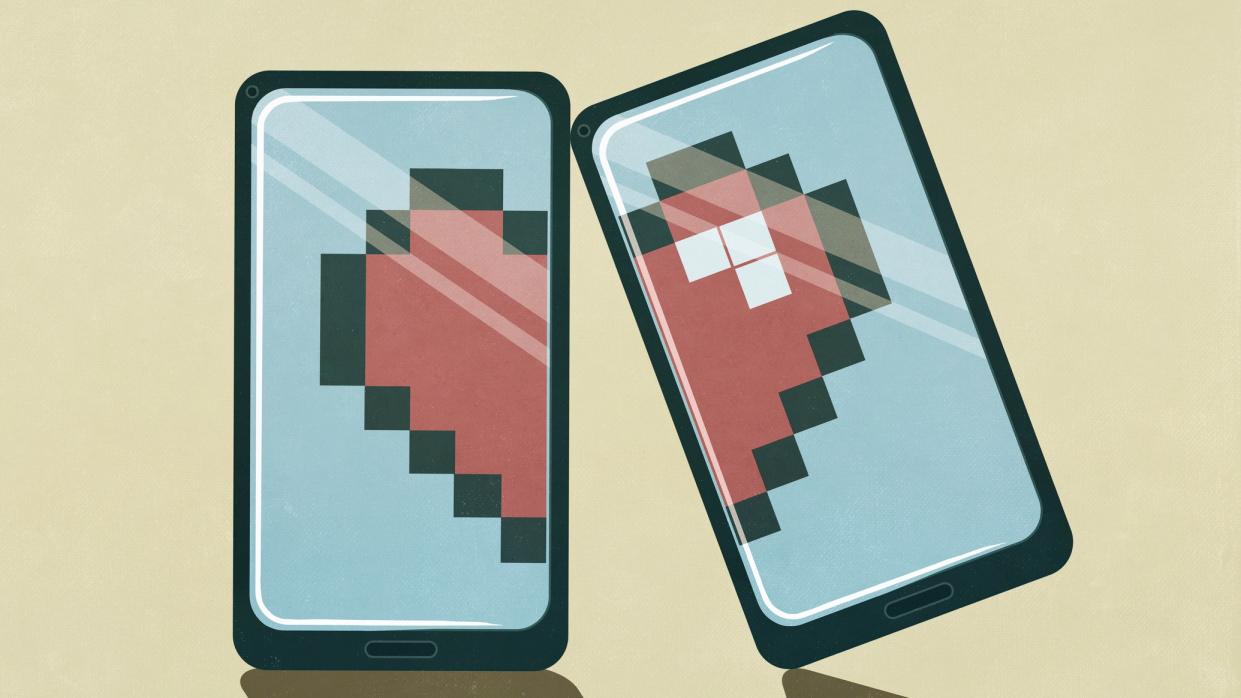Falling out of love with dating apps

The vast majority of young people are no longer using dating apps, according to a new study.
In an Axios survey of nearly 1,000 US college and graduate students, 79% said they didn't use any dating apps, "even as infrequently as once a month". This apparent disinterest may go some way towards explaining a "slide" in the stock price of some of the biggest companies in the online dating industry including Match Group, which owns Tinder and Hinge.
The background
Options "abound" with online dating apps, said the LA Times last year. The paper quoted research showing that "heterosexual couples in the US are now more likely to meet a romantic partner online" than through other forms of connection.
A 2019 study by the Pew Research Centerfound that nearly half of 18- to 29-year-olds in the US claimed to "have used a dating app in their life".
And online dating "reached new heights" in the pandemic, said the LA Times, with Bumble reporting a 70% rise in video calls and Tinder exceeding three billion swipes for the first time in March 2020.
But dating apps today "seem a little lovelorn", said the Financial Times (FT), after 2022 saw the "lowest number of downloads in four years".
Tinder reported an 18.5% year-on-year drop in US users in January, and web traffic among its competitors fell by up to 22%, according to Similarweb.
The latest
According to Axios, most "young people aren't on dating apps". Just 12% of the students quizzed by the news site said they used Tinder, while 8% used Hinge, 8% Bumble, 2% Grindr, 1% used Coffee Meets Bagel, and 3% other apps. The findings matter, said the report, because students tend to be the "target demographic" for dating apps, which are "advertising and hosting campus events".
Many companies in the online dating industry are experiencing stock decline. Bumble's CEO Whitney Wolfe Herd, for example, stepped down this month as the company's "growing pains as a public company continue", said Forbes. The 34-year-old, who became "the youngest self-made female billionaire" in 2021, co-founded Bumble after suing Tinder for sexual harassment.
Her move to executive chair after nearly 10 years in charge, "follows an extended slide for Bumble stock" since it went public in 2021, with its share price now 83% below its all-time high.
Match Group is also "trading at its lowest price" since July 2010, when it became a separate company from IAC, said CNBC, and analysts have also "expressed concern" about its Q4 projections, with expected revenue falling by $30 million.
This comes in addition to concerns about "a falling number of people paying for Tinder", with the company reporting a 6% year-on-year decline in paid subscribers to its online dating service.
The reaction
The majority of young people on campuses "say they prefer to meet people in person", said Axios. "I feel dating apps have ruined the dating scene for many people my age", said Melanie Perez, a junior at Sam Houston State University, in Texas.
It's "no wonder dating is in decline", said The Telegraph's Charlotte Lytton, who believes the "biggest issue" is that "swiping is a full-time job". "Holding down any kind of career" while trying to find a prospective partner through online dating is "laughable", wrote Lytton, who added "this glut of options appears to have done nothing for love nor lust".
Online dating can feel "soul-destroying, unnerving and transactional", said The Guardian's Lizzie Cernik earlier this year, after interviewing couples whose "love lives were transformed when they finally stopped swiping".
While dating apps encourage users to choose potential matches by criteria such as height, age or profession, she wrote, "real-world encounters can bring us face to face with people we might not usually consider".

